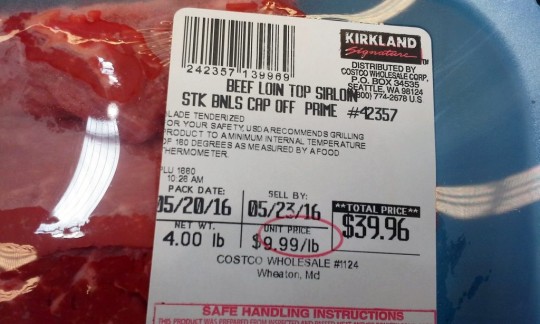
Big Beef’s Dirty Little Secrets Revealed
- The hidden danger in your meat Big Beef doesn’t want you to know about. Discover what it is…
- Will the USDA’s solution work for you? Only if you know where to look. Find out more…
- The one person you need to talk to before you hit the grill.
 Dear Living Well Daily Reader,
Dear Living Well Daily Reader,
Memorial Day weekend is upon us.
And you, like many, may have plans to kick off grilling season with a nice juicy steak.
But before you get to throwing those cuts on the BBQ, you might want to give the label a double-check.
You see, over the last 15 years or so, some meats have been responsible for six outbreaks of food-borne illness according to the CDC. We will dig into this a bit deeper in a while.
Including an extreme case where an Iowa woman named Margaret became so ill from eating a medium rare steak she had to be hospitalized.
In fact, this meat-borne infection was so severe it ruined her colon and almost killed her. Sadly, because of this damage, she now has to wear a colostomy bag for the rest of her life.
And while Margaret’s story is an extreme case, this could happen to anyone who eats a certain type of beef.
But the danger doesn’t lie in the meat itself. It comes from a process so popular that more than 90 percent of beef producers use it.1
It’s not breaking news that processed raw meats bring extra dangers.
For instance, you may have heard that eating ground beef instead of a steak may increase your chances of getting a food-borne illness like E. coli. But an extra precaution is taken with ground beef — E. coli testing.
The problem is this other form of processed beef flies under the radar because it isn’t recognizable like ground meats are. In fact, you would never even know it had been processed.
And it’s even more dangerous because some big beef producers admit they don’t test these cuts for E.coli.
However, the USDA’s Food Safety and Inspection Service (FSIS) is hoping to reduce the risks of you getting sick from it.
Of course, they aren’t taking the steps to end the practice or require testing these adulterated cuts, but instead label them.
Here’s how they can make you sick…
 Tiny Holes, Big Danger
Tiny Holes, Big Danger
Many beef processors and packers often mechanically tenderize certain cuts of meat.
This process, called “needling” or “blading” in the industry, punctures the beef with blades or needles to break down the muscle fiber, which makes the meat easier to chew.
This becomes dangerous when pathogens like E. coli or salmonella are on the surface of the steak. Once tenderized, those bacteria are transferred to the inside of meat, where they can make you sick.
Since there are several outbreaks of food-borne illness linked to this process, FSIS now requires meat packers to label any beef that has been mechanically tenderized and add safe cooking instructions.

Source: pbs.org
Some companies, like Costco, voluntarily labelled their mechanically tenderized meats even before the requirement went into effect last week. But this kind of transparency was rare among meat sellers.
Without this label, it would be hard to decipher whether your steak was mechanically tenderized. It doesn’t look any different and has no detectable needle piercings.
And since over 2.7 billion pounds of beef labeled for sale in the U.S. are mechanically tenderized, chances you may some in your fridge right now.2
However, just because there is a label doesn’t mean the meat is safe unless it is cooked to a minimum of 160 F.
Considering the popularity of rare and medium rare cooked steaks, mechanically tenderizing could still cause problems for some folks.
If you aren’t willing to give up your rare steaks, it’s probably your best bet to talk to your butcher and find out what cuts haven’t been needled or bladed.
But you may want to do this anyway. I went to the market last night and couldn’t find one package of beef with the label on even though the rule took effect on May 17.
Live well,

Natalie Moore
Managing editor, Living Well Daily Insider
Sources
[1] Iowa woman nearly died from eating a tenderized beef steak
[2] What is mechanical tenderizing, and why is it hazardous to your steak?
Written By Natalie Moore
Natalie Moore is a dedicated health researcher with a passion for finding healthy, natural, and science-based solutions. After a decade of direct healthcare experience in western and natural medicine, she was involved in public health research before joining Living Well Daily.
View More Free Articles
The Walking Problem Nobody Talks About (And Why It Matters)
You’ve been walking nearly your entire life. You mastered it before you could tie your shoes—and you’ve been putting one foot in front of the other for decades now without giving it a second thought. But what if I told you that the way you walk right now could be the difference between living independently...
Stop Starving Yourself—"Forbidden" Weight Loss Secret WORKS
Completely cutting out the foods you love from your diet is a recipe for disaster. You know the drill—you swear off chocolate, potato chips, or whatever your weakness is, only to find yourself face-first in a family-size bag three weeks later, wondering what went wrong. Good news—science has finally caught up with common sense. A...
Why Your Muscles Are Your Brain's Best Defense
Forget expensive brain scans and head-scratching cognitive tests that make you feel like you’re back in school. Japanese researchers have stumbled onto something that could change how we screen for memory problems—and it’s so simple, you’ll wonder why nobody thought of it sooner. A quick, painless measurement you can get during a routine checkup might...
Four Carbs that Could Add YEARS to Your Life
You’ve likely been avoiding carbs like the plague. Health gurus, fitness influencers, and diet books have convinced you that carbs are the enemy—that they spike your blood sugar, pack on pounds, and fast-track you to diabetes. So you’ve eliminated bread, sworn off pasta, and feel guilty just touching a piece of fruit. But what if...
Upgrade from Bananas and Apples to These Powerhouse Fruits
I’m often asked which fruits are the best. So, let’s talk about it. I’ll cut right to the chase: berries win this contest hands down. If you’re limiting your options to apples and bananas, you’re missing out on a universe of superior antioxidant power. Those everyday fruits are like bringing a knife to a gunfight...
The REAL Reason Americans are Getting “Fatter”
You’ve heard it a thousand times: “Americans are getting fatter because we’re lazy.” We sit at desks all day. We binge-watch Netflix instead of hitting the gym. We’ve traded physical labor for sedentary lifestyles. It’s a tidy explanation for why obesity has skyrocketed in developed countries. There’s just one problem—it’s completely wrong… A groundbreaking Duke...
Mailbag: Room Won't Stop Spinning? Do THIS First
“I’m dealing with vertigo issues, lightheadedness, and dizziness. As recently as this last Saturday I had multiple occurrences throughout the day. Is there anything I can do for this? I’m 69 and in good health. I work out 4 to 5 times a week.” —Spinning Hi Spinning, When patients approach me with similar complaints, I...
Hidden Number Secretly Sabotages Male Performance
Guys (and gals that love them), we should talk. You know how we’ve always been told that bedroom troubles are just part of getting older—that we just need to live with them? Well, it turns out that’s not true. Scientists recently wrapped up a six-year study that followed over 100 healthy men, and the findings...
Shocking Study Links Kids' Snacks to Dangerous Early Puberty
Kids are growing up in a world vastly different from the one we knew. Back in our day, if a child wanted something sweet, it was a piece of candy or a homemade cookie. Today’s kids are surrounded by products filled with artificial sweeteners that didn’t even exist when we were raising our own children....
Outdated Vitamin Guidelines Put Your Brain at Risk
If you’re like most people, you probably don’t think twice about vitamin B12—until your doctor mentions it during a routine blood test. But new research published in the Annals of Neurology suggests we need to pay closer attention to this crucial nutrient—especially as we age. Turns out, current guidelines for this essential nutrient might be...









